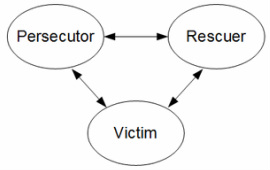Holistic Psychotherapy & Healing
As a therapist, I find that a large percentage of people who come into the consulting office are doing so to get help with relationship entanglements. Clients may complain of problems in getting along with a spouse, with children, with their family of origin such as siblings or parents, or with people at work. Even people whose primary complaint is stress, anxiety, or depression will often report significant issues of conflict with others, either as a result of their symptoms or, more likely, as the original cause of them. In other words, they are often stressed, anxious, or depressed about something, and that something is likely to be a conflictual relationship somewhere in their life.
The Drama Triangle
Transactional Analysis provides us with an elegant framework for understanding clients’ relationship entanglements. This framework is known as the Drama Triangle. This is a term for an interpersonal “vortex” in which one person takes on the role and mindset of a Victim, Persecutor or a Rescuer. Other people then get pulled into complementary roles in the Triangle. The exact role a person takes on may vary from one episode to another, and even from one moment to another. As one person shifts roles, so do, unwittingly, the people around them, leading to a dance around the Triangle that nobody seems to be able to escape.
The classic example is of a woman who is in an altercation with her boyfriend. Neighbors hear the commotion, and call the police. When the police officer arrives, she sees the woman (Victim) being intimidated and pushed around by the boyfriend (Persecutor). The officer (Rescuer) tells the boyfriend to cut it out. Then the Drama Triangle shifts around. The boyfriend, feeling harrassed by the officer, says, “Hey, this is just between me and her!” The officer moves forward threateningly and talks about arresting him. The woman now breaks in and tells the officer to leave her boyfriend alone. The woman (Rescuer) is trying to help her boyfriend (Victim) against the officer’s power (Persecutor). The officer, who started trying to help a woman in an obvious case of domestic abuse, is now feeling outnumbered and perplexed (Victim). Or, she might get irritated at the girlfriend who won’t let her intervene properly (Persecutor). And so the dance continues.
In fact, anyone who jumps in to “help” someone out of a relationship entanglement is as likely to get roped in as they are to pull out the Victim. Therapists, with our desires to help and to heal others, are prime targets for getting roped in before we know it.
When I see clients enacting the Drama Triangle, I have found it very useful to draw it out as a schematic for them, just like the above picture, and then to ask them to identify themselves in the various roles above. Clients quickly understand the trap that the Drama Triangle makes for them and for the people with whom they are entangled.
If a client is shown the schematic, they can then begin to identify in the course of their own life when they fall into one or more of the roles. Usually there are preferred roles, but just as often, while the dance may start for them in one corner it cycles through all the roles, even within a single altercation. The Drama Triangle is a powerful tool for raising awareness of what is often a long-standing, unconscious pattern of behavior.
How, though does one escape the Drama Triangle? I believe that awareness itself opens the door to choice. Some people are quickly able to stop much of the provocative behavior that would have led to them entering the Triangle in at least one important relationship. Other clients, however, return with some frustration: “I know I keep getting trying to rescue people, like I seem to have done my whole life, but I don’t know how to stop. What else can I do?”
In the next article, I will discuss the alternative approach to the Drama triangle, called the “Connecting Triangle”. This approach to relationships offers a healthy way to get close to others, while also empowering others and remaining empowered, oneself.
About Me
Ameet Ravital, PhD is a clinical psychologist with over 20 years of experience, in private practice in Philadelphia, PA.
Psychotherapy
I have a holistic approach to psychotherapy, which includes teaching mindfulness, self-acceptance, and conflict resolution skills.
Insurance & Fees
Here is a list of my current fees, as well as options for insurance reimbursement for psychotherapy consultations.
Copyright 2024, Ameet Ravital, PhD
